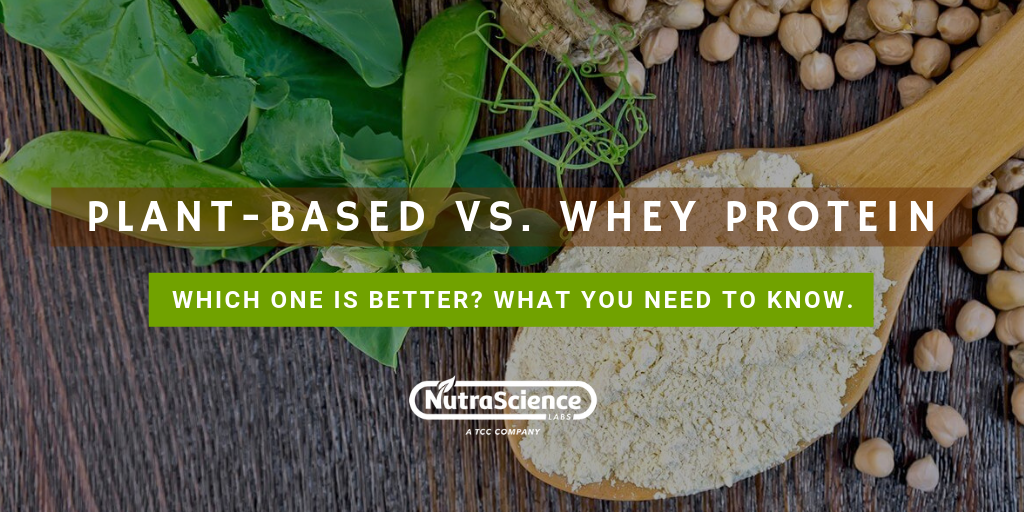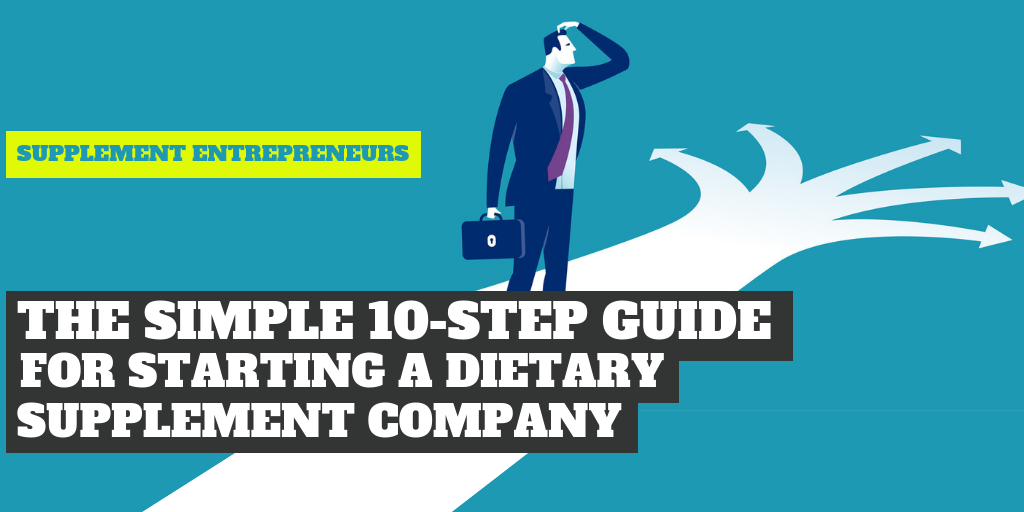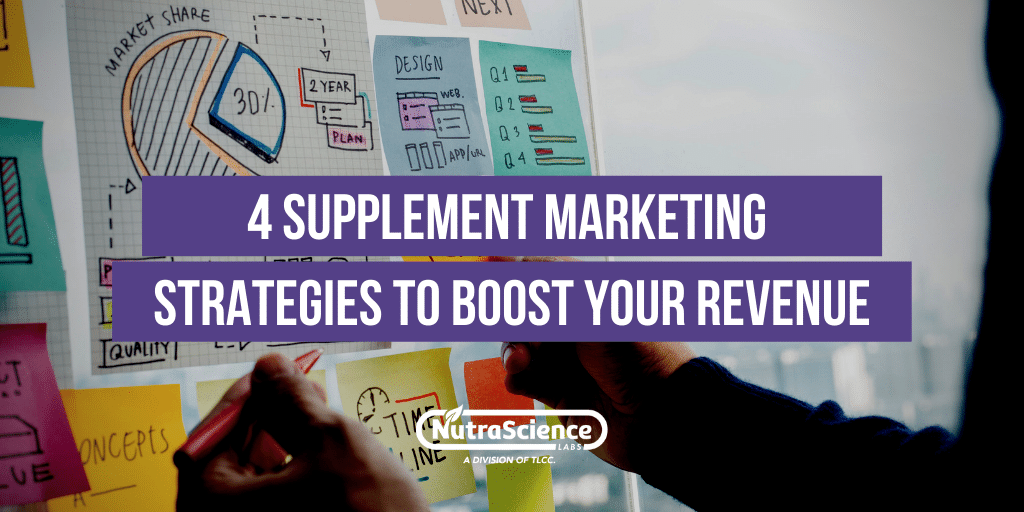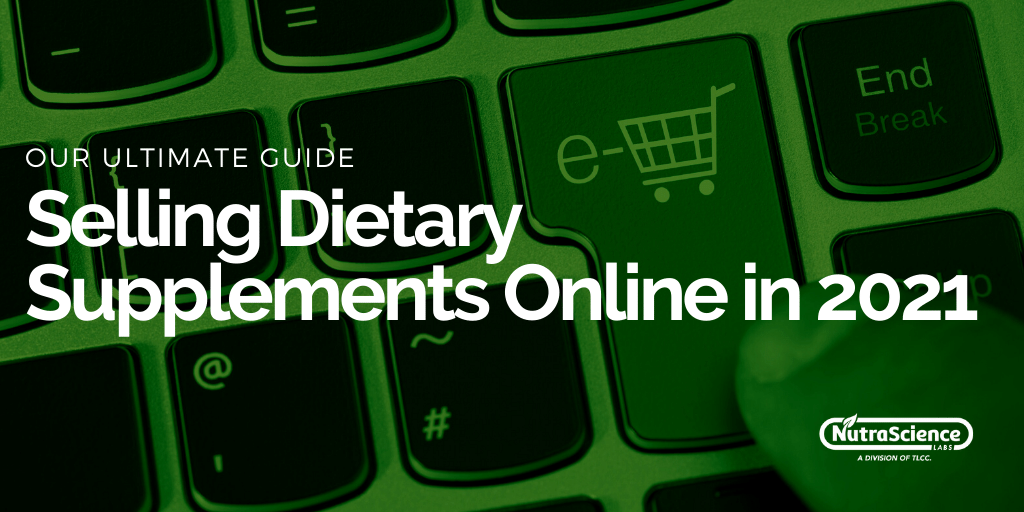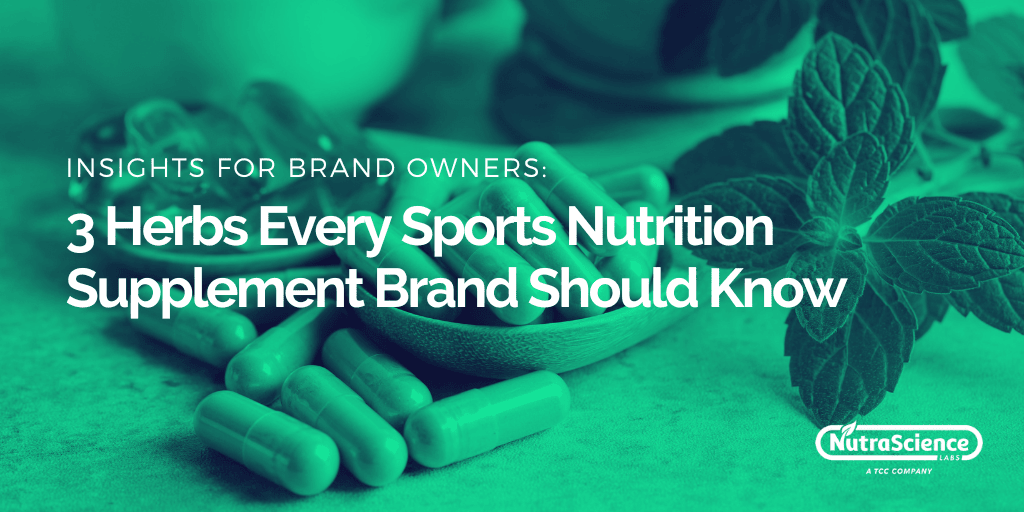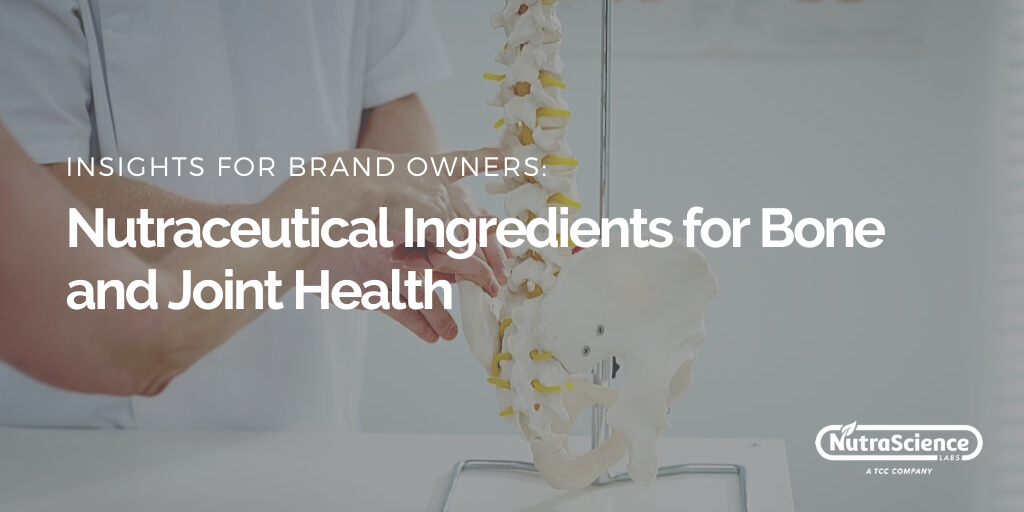Plant-Based Protein vs. Whey Protein: Which One Is Better?
Protein is a crucial macronutrient often known as the building block of muscles, skin, bones, blood, and cartilage. The building blocks of proteins (monomers) are amino acids. It is a vital component of the human cell and is used by the body for:
- Building and repairing tissues
- Producing hormones, enzymes, and other body chemicals
There are two types of popular protein supplements currently available in the market:
- Whey protein
- Plant-based protein
These two types of protein are derived from different sources and have their unique properties. Here’s all you need to know about them, to help you choose the most appropriate one to add to your dietary supplement line.
How are Whey Protein Powders and Plant-Based Powders Made?
Whey is the watery part of milk that remains after the formation of curds. In its original liquid state, whey is a mixture of mostly water with some protein, fat, carbohydrates (predominantly lactose). When whey is processed and filtered to remove most or all of the fat and carbs, what remains is whey protein. The whey protein is dried, and then used in whey protein powder products.
Plant protein powders are made in a similar way. The plant material (e.g. peas, soy, rice) is dried and powdered. Then it is extracted, processed and filtered to remove other components such most of the fat and carbohydrates, depending upon the plant. The final material is dried, and then used in plant protein powders.
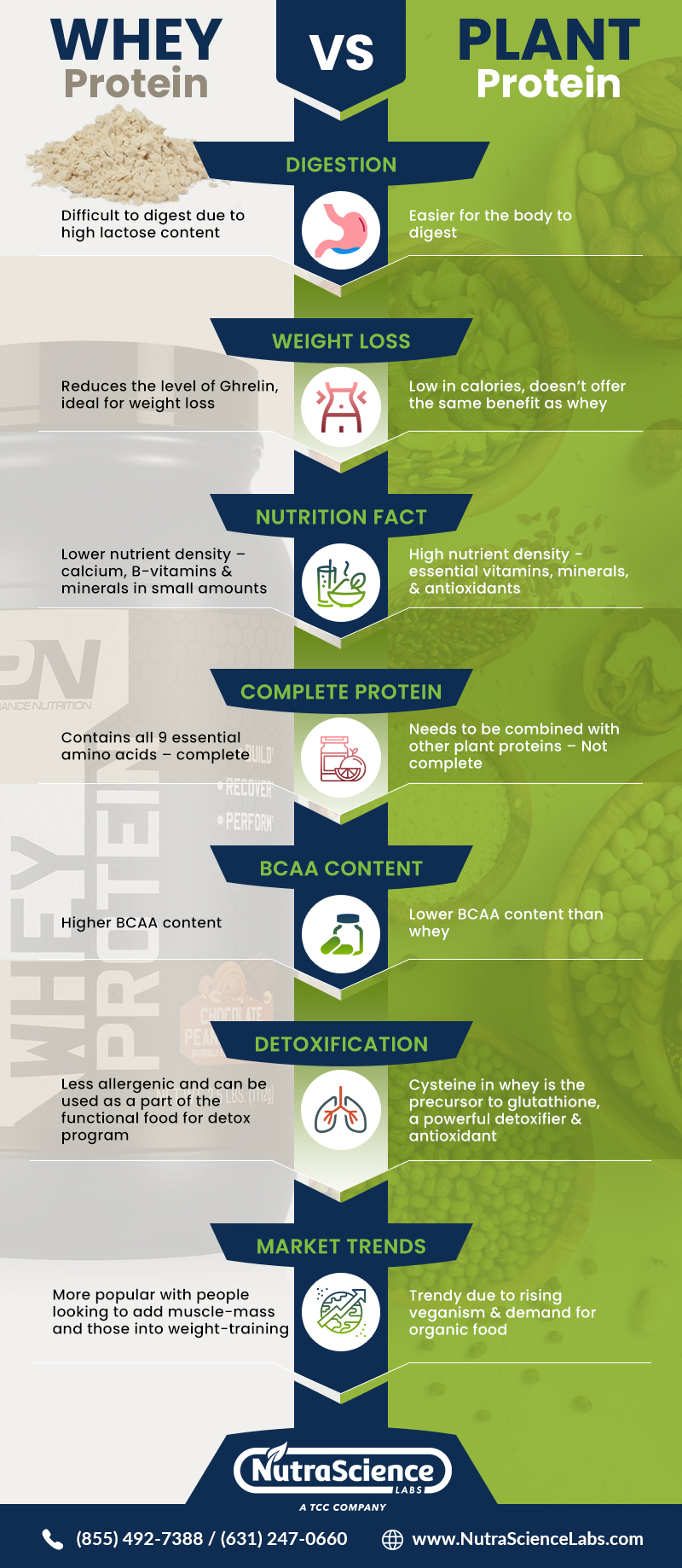
What Is Plant-Based Protein?

Plant-based proteins are derived from pea, pumpkin, chia, and many other types of plants. They are made in several ways depending on the crop from which they are sourced. For example, to make pea protein, soluble pea protein is extracted from yellow split peas. The pea flour produced is then dried and re-hydrated.
What Are the Health Benefits of Plant-Based Protein?
- Easier to digest – Plant-based proteins are easier to digest compared to other types of proteins.
- Hypoallergenic – Except soy, the rest of the plant-based proteins such as pea and rice proteins, are well tolerated by the human body. And, they are found to be ideal for people with lactose-intolerance and allergies.
- Part of detox program – As plant-based proteins are less allergenic, they are a part of functional foods used for detox programs.
What Is Whey Protein?
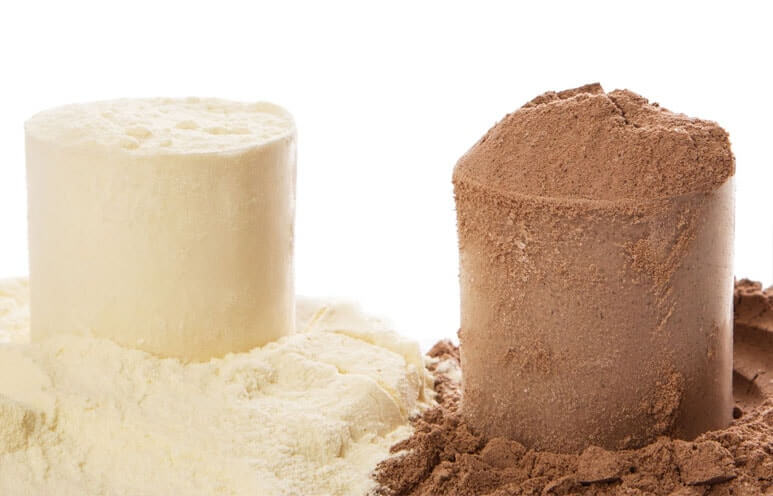
Milk consists of two components: Whey and casein. Milk is put through a filtration system, and what you get is Whey protein concentrate. This concentrate is then dried and transformed into diverse varieties that you often encounter in the form of supplements and powders.
What Are the Health Benefits of Whey Protein?
Some of the health benefits of whey protein benefits are
- It is a complete protein – Whey protein contains a full spectrum of nine essential amino acids that our body cannot prepare. These amino acids are crucial for the functioning and growth of muscles.
- It is higher in Branched Chain Amino Acids (BCAAs) – BCAAs present in the whey protein such as leucine, isoleucine, and valine are required for muscle growth and maintenance.
- It boosts the immune system – The special molecules called immunoglobulins, present in whey protein, stimulate immune function. It also contains Lactoferrin – the key immune-boosting molecule with anti-microbial and anti-cancer properties.
- It supports detoxification – The higher amounts of amino acid cysteine make whey proteins capable of supporting detoxification. This amino acid is the precursor to glutathione, which is a powerful detoxifier and antioxidant.
Both types of proteins have their sets of health benefits as well as limitations, and you can take an informed decision after gaining in-depth knowledge about them.
Does Whey Protein Help You Build Muscle?
Our body utilizes high levels of Branched Chain Amino Acids (BCAAs) offered by whey proteins to strengthen lean muscle tissues both during and after exercise sessions. It also contains leucine – an essential amino acid that plays a vital role in muscle protein synthesis and growth.
Does Plant Protein Help You Build Muscle?
A significant amount of research, including the one conducted by the researchers at The University of Ohio, suggests that certain plant proteins such as rice protein led to an increase in muscle thickness and lean body mass almost equivalent or insignificantly lesser than the results generated by participants consuming whey protein. Additionally, a study conducted in 2015 confirmed that pea protein was as effective as whey protein at increasing muscle thickness.
Whey or Plant-Based Protein - Which is Better for Building Muscle?
When it comes to building muscles, both plant protein and whey protein can be equally good. So, now it all depends on your taste and preferences.
Whey Protein vs. Plant-Based Protein for Weight Loss
Studies reveal that a high consumption of whey protein reduces the levels of ghrelin – a hormone that signals the brain when you are hungry. And so, you feel more satisfied and fuller for longer periods during the day and end up eating less and avoiding excess calories.
This makes whey protein ideal for fat loss.
On the other hand, plant-based proteins are lower in calories per serving as compared to animal proteins, even though they don’t offer the same weight loss benefit as that of whey protein.
Whey vs. Plant Protein Nutrition Facts
Whey Protein:
- Does not contain much besides protein
- Contains calcium, B-vitamins, and other vitamins & minerals in small amounts
- During production, whey is heated up to 280 degrees Fahrenheit. This ultra-pasteurization destroys naturally occurring digestive enzymes and vitamins besides killing bacteria
Plant-Based Proteins:
- Have a high nutrient density
- Are loaded with essential vitamins, minerals, fiber, antioxidants, and iron
- Contain essential fatty acids
Which One is Easier to Digest - Whey Protein or Plant-Based Protein?
Whey protein is made from milk and thus contains lactose that requires a digestive enzyme, named lactase to break it down. As we age, our small intestine secretes less lactase, making it difficult for our bodies to digest lactose. According to estimates, around 65 percent of the human population has a reduced ability to digest lactose after infancy and may suffer from intestinal discomfort, bloating or gas and fatigue due to lactose.
As plant-based proteins are free from milk-derived ingredients, they do not contain lactose and are easier on our digestive systems. Also, most plant proteins are hypoallergenic and are digested by almost everyone without any adverse effects.
Whey vs. Plant-Based - Which One is a Complete Protein?
Our body cannot make nine out of the 20+ amino acids that are required for its growth as well as functioning. And so, it depends on external sources like supplements to fill this gap. Whey protein, derived from milk, consists of all the nine essential amino acid required by our body whereas no single plant can offer all the nine amino acids.
However, the right combination of multiple plant-based proteins can offer the complete amino acid profile:
- The combination of brown rice and pea protein, or
- A combination of pea protein with other plant proteins like quinoa or hemp.
What is the BCAA Content of Whey Protein Vs. Plant Protein?
According to the U.S. Dairy Council, whey protein offers the highest concentration of BCAAs of any dietary source of protein at about 26 g of BCAAs per 100 g of protein (i.e. 26% BCAAs). The three BCAAs include leucine, isoleucine and valine.
By contrast, the BCAA content of plant proteins range between 18-19%, which is still a good amount.
Market Trends - Plant vs. Whey Protein
Due to their benefits and lower side effects, plant-based proteins are becoming increasingly popular among consumers.
To illustrate this point further, I recently recorded a podcast with our New Business Development Manager, Ryan Gillen. At one point during our conversation, we discussed why now is the perfect time for brand owners to develop and bring a high-quality plant protein supplement to the market.
You can watch the episode in its entirety by clicking below.
What's more, online searches for plant protein powder have more than tripled over the last decade. Some of the reasons for this trend are:
- Reduced Meat Consumption: More and more people are refraining from eating meat to keep in line with various health benefits including nutrition, weight control, and heart health. Studies reveal that in 2017, 39% Americans opted to change their eating habits by adding more plant-based proteins in their diet while another research shows 60% respondents scaling back their meat intake.
- Shift to Veganism: An increasing number of people are adopting veganism, and according to research data, since 2014, veganism in the US alone has skyrocketed by 500%.
- Rising Demand for Organic Food: Concerns about the usage of antibiotics and growth hormones in cattle, genetically modified vegetables and organisms, and the usage of toxic pesticides and herbicides in fruits are causing an increase in demand for organic, unprocessed food.
How Can NutraScience Labs Help You?
If you’re thinking about launching a new plant-based or whey protein powder or re-formulating your existing product, NutraScience Labs is ready to work with you!
Our team possesses over 120 years of nutraceutical industry experience and has successfully brought over 2,300 dietary supplement brands to market. We specialize in providing custom contract manufacturing and flavoring services to brand owners that are interested in or currently selling Sports Nutrition and Bodybuilding, Digestive Support, Bone and Joint Support, Weight Management and Cognitive Health Support supplements.
For more information on how our team can assist you, give us a call 24/7/365 at 855-492-7388 or send us your request to receive a free nutraceutical manufacturing quote in 48 business hours.
References and Infographics:

